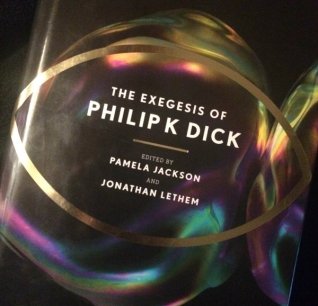I am about a month behind in the Exegesis read along, but I still want to post some thoughts. You can see my intro post about it here.
 The first fifty pages (and to be honest, I feel the pattern will hold for the entirety of the volume) are an odd mix of borderline unhinged pronouncements (of the ‘I’m getting messages from aliens’ type) and simply examples of someone trying to figure out where thoughts, visions, and creativity come from, and trying to explain it in terms both neurophysiological and mystical. At least for me, the beginning of Exegesis is peculiar but not outrageously so. Perhaps it is because at one point I myself lived on a somewhat steady diet of mystical literature, from myth analyses to Jungian alchemical essays. Perhaps it is simply recognition that this is another human mind trying to figure out itself, though PKD’s take on it might be more peculiar than most.
The first fifty pages (and to be honest, I feel the pattern will hold for the entirety of the volume) are an odd mix of borderline unhinged pronouncements (of the ‘I’m getting messages from aliens’ type) and simply examples of someone trying to figure out where thoughts, visions, and creativity come from, and trying to explain it in terms both neurophysiological and mystical. At least for me, the beginning of Exegesis is peculiar but not outrageously so. Perhaps it is because at one point I myself lived on a somewhat steady diet of mystical literature, from myth analyses to Jungian alchemical essays. Perhaps it is simply recognition that this is another human mind trying to figure out itself, though PKD’s take on it might be more peculiar than most.
Peculiarity here is mixed with a dose of self-importance, which might be inflated because most of this was not written for others’ eyes. The idea that one’s novels are predicting the future, coming true, and, in fact, forming said future is a great science fiction concept. And therein lies the Exegesis rub. Is PKD living in a PKD novel? Is he writing non-fiction for some distant future? Are his novels, upon leaving his mind and typewriter, go on to change the fabric of reality itself? He seems to believe all or some of these things.
And for those of you who are wondering whether this volume is a slog: it isn’t. It is, oddly enough, quite readable, something which a few of us in this read along pointed out. I have a feeling we are all going to come after having reached page 300 or thereabouts and renounce our words, but we’ll see. Is it worth your time? It depends. If you think you will enjoy not-intended-for-publication self-examination ramblings full of religious and philosophical references, then I think you’ll have a blast.






